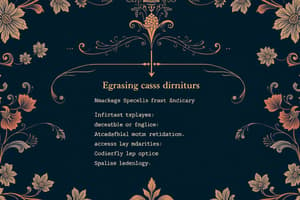Podcast
Questions and Answers
What are access modifiers in Java?
What are access modifiers in Java?
Access modifiers are used to change the level of access in classes.
What is the 'private' access modifier?
What is the 'private' access modifier?
'private' access modifier is used to make fields and methods unreachable; they can only be accessed within the class itself.
What is the 'public' access modifier?
What is the 'public' access modifier?
'public' access modifier is used to make fields and methods accessible anywhere in the project.
What is the 'protected' access modifier?
What is the 'protected' access modifier?
Can classes in Java be declared protected?
Can classes in Java be declared protected?
What cannot be declared as private?
What cannot be declared as private?
What is the 'default' access modifier?
What is the 'default' access modifier?
What is the difference between default and public classes?
What is the difference between default and public classes?
What are the similarities between default and public classes?
What are the similarities between default and public classes?
TRUE OR FALSE: 'private' access modifier is used to make fields and methods only accessible within the same package.
TRUE OR FALSE: 'private' access modifier is used to make fields and methods only accessible within the same package.
Flashcards are hidden until you start studying
Study Notes
Access Modifiers in Java
- Access modifiers control the level of access for classes, fields, and methods in Java.
- There are four access modifiers: public, protected, default, and private.
Class Access Modifiers
- Public Class: Accessible from anywhere in the project.
- Default Class: Accessible only by classes in the same package.
- Protected Class: Accessible within the same package and by subclasses outside its package.
- Private Class: Inaccessible by other classes, accessible only within its own class.
Private Access Modifier
- The private access modifier restricts access to fields and methods to within the defining class only.
Public Access Modifier
- The public access modifier allows fields and methods to be accessed from any location in the project.
Protected Access Modifier
- The protected access modifier allows access only within the same package and to subclasses, even if they are in different packages.
Class Declarations
- Classes cannot be declared as protected; this modifier is utilized primarily in the context of inheritance.
- Classes and interfaces cannot be declared as private.
Default Access Modifier
- The default access modifier permits access only within the same package without needing an import statement.
Differences Between Default and Public Classes
- Default classes are limited to the package they were created in and cannot be accessed outside of it.
- Public classes are accessible from any package, providing broader use.
Similarities Between Default and Public Classes
- Both types of classes can be used within the same package without any issues.
- No import is required when using default and public classes in the same package.
True or False
- The statement that the private access modifier allows fields and methods to be accessible only within the same package is FALSE. It restricts access to within the class itself.
Studying That Suits You
Use AI to generate personalized quizzes and flashcards to suit your learning preferences.




